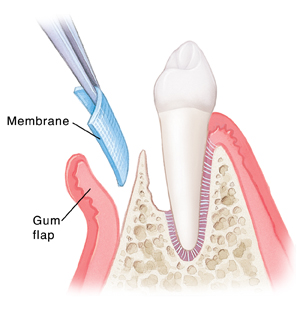
Regenerative procedures lead to the regeneration of any tissue or bone of your gums that are damaged due to periodontal disease, which is caused by bacterial infection. The regenerative process includes the folding back of the gum tissue to remove the disease-causing bacteria.
About the Regenerative Procedure
The regenerative procedures slow down the decaying process and enable the growth of new bone in the affected part. The regenerated bone gives tooth support. Restoring even half of the lost tooth bone can greatly increase the tooth’s life.
Who Qualifies for the Regenerative Procedure?
Anyone with a bacterial infection in the gum or tooth qualifies for regenerative procedures. Doctors typically recommend regenerative procedures if the supporting bone of your teeth is damaged.
Always contact your dentist from the dental clinic in Hyderabad in case of any such issues.
Request an appointment at Apollo Dental, Hyderabad Call 18001020288 to book an appointment
Why is the Regenerative Procedure conducted?
The regenerative procedure slows down the decaying process and gives the body time to regenerate and repair the affected parts. For instance, in the case of gum infection; the membrane placed between the damaged gum and bone allows it to heal and regenerate.
Types of Regenerative Procedures- Depending on the affected part, there can be different types of regenerative procedures:
- Gum Tissue Regeneration- Gum tissue regeneration (GTR) is the process performed for gum grafting. It is due to bacterial infection in the gums. The affected gum is opened by the flap procedure and the area is then cleaned. Next, a membrane is placed over the damaged gum and bone. This membrane gives the bone time to heal and regenerate. After some time, the stitches either dissolve or are manually removed. In between, you must follow healthy oral hygiene to prevent any further infection. A regular check-up visit to your dentist is a must.
- Bone Regeneration- The bacteria may penetrate the jawbone, causing damage to it. The bone regeneration procedure stimulates the growth of new bone. It includes the implantation of a small bone graft material. The dentist numbs the area using anaesthesia before performing the procedure. Then, they clean and disinfect the area before implanting the graft. The bone graft gives the body enough time and space for regeneration.
- Scaling and Root Planing- Scaling is the process of removal of plaque or tartar from the upper gum line (supragingival region). Root planing, in contrast, removes tartar and plaque from the lower gum line (subgingival region).
- Pocket Reduction Surgery- The pocket reduction surgery includes the reduction of the depth of the gum pockets. This eventually makes it harder for bacterial penetration. It is an effective measure for halting tissue loss and promoting the natural healing of the gums.
Benefits of Regenerative Procedures
The benefits of the process are as follows:
- It gives time for the natural regeneration process of the body.
- It prevents further decaying of oral parts.
- It promotes a decrease in apical diameter.
- It increases tooth survival rate and gives resistance to fracture.
Risk or Complications of Regenerative Procedures
If you take proper care, there are rarely any complications. However, some of the complications are:
- Pain or swelling in the first week.
- Pus discharge after a bone grafting.
- Infection
- Bleeding
Visit the dental clinic in Hyderabad in case of any such complications.
Conclusion
Regenerative procedures treat any periodontal disease of your gums. The disease may be caused by bacterial infection. The process prevents decay and promotes the growth of new tissues by giving support. Depending upon the affected part, there can be different types of regenerative procedures such as Gum Tissue Regeneration, Scaling and Root Planing, Pocket Reduction Surgery and Bone Regeneration.
A dental regenerative procedure includes the regenerative of the damaged part due to some bacterial infection.
The benefits of the process are that it gives time for the natural regeneration process of the body and prevents further decaying of oral parts.
Pulpal regeneration is the complete regeneration of damaged dental pulp by the regenerating procedures.



















































